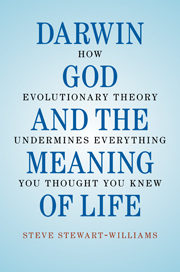 Darwin, God and the Meaning of Life
Darwin, God and the Meaning of Life Published online by Cambridge University Press: 05 June 2012
Scientists and humanists should consider together the possibility that the time has come for ethics to be removed temporarily from the hands of the philosophers and biologized.
E. O. Wilson (1975), p. 562We believe that we should love our neighbour as ourselves, because it is in our biological interests to do so.
Michael Ruse (1988), p. 74Morality is the device of an animal of exceptional cognitive complexity, pursuing its interests in an exceptionally complex universe.
Martin Daly and Margo Wilson (1988), p. 254Evolutionary ethics
Evolutionary theory is unique in its ability to inflame passions and catalyse debate. One particularly heated area of debate concerns the impact of the theory for ethics. Some flatly deny that evolution has any relevance to ethics, a view they support by arguing that values cannot be derived from mere facts about the world. Others dispute this, although among this group there is little consensus about what exactly the moral implications of Darwin's theory might be. Some argue that the theory supports laissez-faire social policies and the abolition of social welfare. Others argue that it forces us to rethink and recalibrate our moral priorities, and to reassess the value we place on the lives of humans v. other animals. Finally there are those who draw a darker conclusion, suggesting that the truth of evolutionary theory undermines morality altogether. In the remaining chapters, we'll consider each of these views in turn.
Before we do that, though, we'll examine the evolutionary underpinnings of morality.
To save this book to your Kindle, first ensure no-reply@cambridge.org is added to your Approved Personal Document E-mail List under your Personal Document Settings on the Manage Your Content and Devices page of your Amazon account. Then enter the ‘name’ part of your Kindle email address below. Find out more about saving to your Kindle.
Note you can select to save to either the @free.kindle.com or @kindle.com variations. ‘@free.kindle.com’ emails are free but can only be saved to your device when it is connected to wi-fi. ‘@kindle.com’ emails can be delivered even when you are not connected to wi-fi, but note that service fees apply.
Find out more about the Kindle Personal Document Service.
To save content items to your account, please confirm that you agree to abide by our usage policies. If this is the first time you use this feature, you will be asked to authorise Cambridge Core to connect with your account. Find out more about saving content to Dropbox.
To save content items to your account, please confirm that you agree to abide by our usage policies. If this is the first time you use this feature, you will be asked to authorise Cambridge Core to connect with your account. Find out more about saving content to Google Drive.